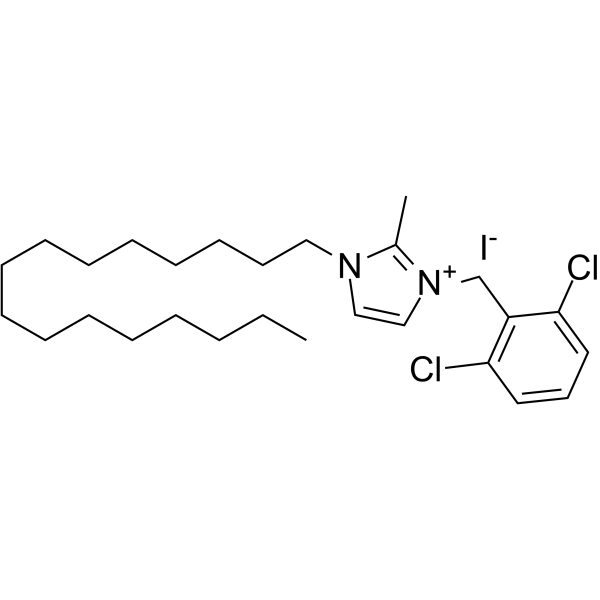Aldometanib (Synonyms: LXY-05-029) |
| Catalog No.GC66024 |
L'aldometanib (LXY-05-029) est un inhibiteur de l'aldolase actif par voie orale. L'aldometanib peut activer la protéine kinase activée par l'adénosine monophosphate lysosomale (AMPK) et diminuer la glycémie. L'aldometanib peut être utilisé pour la recherche de l'homéostasie métabolique.
Products are for research use only. Not for human use. We do not sell to patients.

Cas No.: 2904601-67-6
Sample solution is provided at 25 µL, 10mM.
Aldometanib (LXY-05-029) is an orally active aldolase inhibitor. Aldometanib can activate lysosomal adenosine monophosphate-activated protein kinase (AMPK) and decreases blood glucose. Aldometanib can be used for the research of metabolic homeostasis[1].
Aldometanib (0-1000 nM; 2 h) activates AMPK by preventing aldolase from binding to FBP to engender a pseudo-starvation signal[1].
Western Blot Analysis[1]
| Cell Line: | Mouse primary hepatocytes, MEFs cells |
| Concentration: | 0-1000 nM |
| Incubation Time: | 2 h |
| Result: | Activated AMPK in mouse embryonic fibroblasts (MEFs) and mouse primary hepatocytes cells. |
Immunofluorescence[1]
| Cell Line: | MEFs cells |
| Concentration: | 5 nM |
| Incubation Time: | 2 h |
| Result: | Inhibited TRPVs and induces AXIN lysosomal translocation. |
Aldometanib (oral; 0-10 mpk) reduces blood glucose in lean mice[1].
Aldometanib (oral; 2-10 mpk; twice daily; for a week) reduces blood glucose and alleviates fatty liver in obese hyperglycaemic mice[1].
Aldometanib alleviates fatty liver and nonalcoholic steatohepatitis[1].
Aldometanib (oral; 2mpk; twice-daily; for a month) alleviates liver fibrosis in NASH mice[1].
Aldometanib (oral; 0-50 μM; 0-50 days) extends lifespan in C. elegans via the lysosomal pathway[1].
| Animal Model: | Lean mice[1] |
| Dosage: | 0-10 mpk |
| Administration: | Oral |
| Result: | Decreased fasting blood glucose and improved glucose tolerance, promoted muscular TBC1D1 phosphorylation and glucose uptake. |
| Animal Model: | Obese hyperglycaemic mice[1] |
| Dosage: | 2-10 mpk |
| Administration: | Oral, twice daily, for a week |
| Result: | Decreased blood glucose, lowered blood glucose in a muscular AMPK-dependent manner reduced hepatic TAG, improved insulin sensitivity, increased glucose disposal rates, inhibited TAG synthesis in liver and primary hepatocytes, decreased fat mass. |
| Animal Model: | NASH mice[1] |
| Dosage: | 2 mpk |
| Administration: | Oral, twice-daily, for a month |
| Result: | Decreased histological scores used to describe the features of NASH, reduced apoptosis rate of hepatic cells, inhibited inflammatory responses in the liver of NASH mice and improved glucose tolerance of NASH mice. |
| Animal Model: | C. elegans[1] |
| Dosage: | 0-50 μM |
| Administration: | Oral, 0-50 days |
| Result: | Promoted oxidative stress resistance and mitochondrial functions in C. elegans. |
| Animal Model: | C57BL/6 mice[1] |
| Dosage: | 100 μg/mL |
| Administration: | Oral |
| Result: | Extended lifespan, elevated NAD?? levels and mitochondrial oxidative respiration, rejuvenated muscle function in aged mice. |
Average Rating: 5 (Based on Reviews and 30 reference(s) in Google Scholar.)
GLPBIO products are for RESEARCH USE ONLY. Please make sure your review or question is research based.
Required fields are marked with *




















